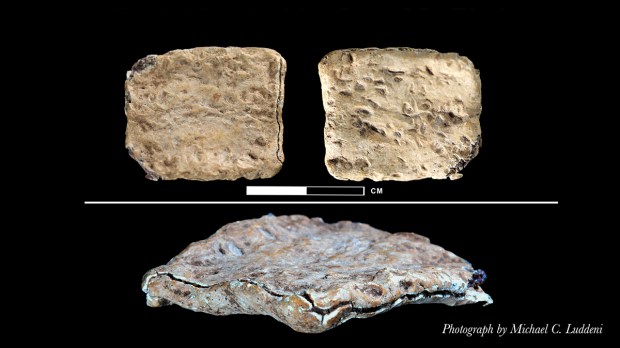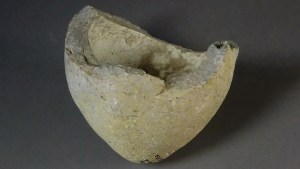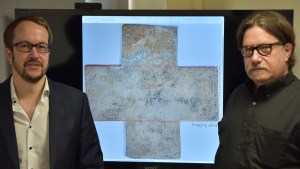Lenten Campaign 2025
This content is free of charge, as are all our articles.
Support us with a donation that is tax-deductible and enable us to continue to reach millions of readers.
The oldest text in ancient Hebrew ever found in Israel happens to be a curse. It is dated around the year 1200 BC and was found at Mount Ebal in the West Bank (the biblical Schechem, the first capital of the Kingdom of Israel following the split of the United Monarchy).
The text, which is inscribed on an amulet, was introduced to the world last March 25 during a press conference. What makes this finding so special is that it is the first object containing not isolated words (which have been found on numerous pottery shards) but full phrases and sentences.As Zvi Koenigsberg explains in his article for The Jerusalem Post, this amulet “attests to literacy among the ancient Israelites many hundreds of years earlier than conventional academic thinking,” which suggests that some biblical texts may have been written as early as 1200 BC.
That the text in the amulet contains a curse is also exceptional. Koenigsberg explains the talisman connects the archaeological site of Ebal with what the biblical texts say about the place: in Deuteronomy, Ebal is also known as the Mountain of the Curse. Deuteronomy 11, 29 reads:
When the Lord your God has brought you into the land that you are entering to occupy, you shall set the blessing on Mount Gerizim and the curse on Mount Ebal.
Later, in Deuteronomy 27, a list of curses is included. In fact, verse 11 and following are known as “the Twelve Curses,” in a kind of “negative” version of the Ten Commandments. Part of the text reads as follows:
So when you have crossed over the Jordan, you shall set up these stones, about which I am commanding you today, on Mount Ebal, and you shall cover them with plaster. And you shall build an altar there to the Lord your God, an altar of stones on which you have not used an iron tool […] And these shall stand on Mount Ebal for the curse: Reuben, Gad, Asher, Zebulun, Dan, and Naphtali. Then the Levites shall declare in a loud voice to all the Israelites:
“Cursed be anyone who makes an idol or casts an image, anything abhorrent to the Lord, the work of an artisan, and sets it up in secret.” All the people shall respond, saying, “Amen!”
“Cursed be anyone who dishonors father or mother.” All the people shall say, “Amen!”
“Cursed be anyone who moves a neighbor’s boundary marker.” All the people shall say, “Amen!”
“Cursed be anyone who misleads a blind person on the road.” All the people shall say, “Amen!”
“Cursed be anyone who makes an idol or casts an image, anything abhorrent to the Lord, the work of an artisan, and sets it up in secret.” All the people shall respond, saying, “Amen!”
Konigsberg explains that “this is another record-breaker: it is the first time a site has been discovered that matches a segment of the Torah point-by-point.” What is even more striking is that the amulet might show that the Ebal segment of Deuteronomy is at least 600 years earlier than what biblical scholarship has commonly assumed.
You can read Koenigsberg’s article for The Jerusalem Post here.



